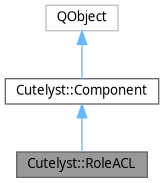 |
cutelyst 4.3.0
A C++ Web Framework built on top of Qt, using the simple approach of Catalyst (Perl) framework.
|
 |
cutelyst 4.3.0
A C++ Web Framework built on top of Qt, using the simple approach of Catalyst (Perl) framework.
|
User role-based authorization action role. More...

Public Member Functions | |
| RoleACL (QObject *parent=nullptr) | |
| bool | aroundExecute (Context *c, QStack< Component * > stack) override |
| bool | canVisit (Context *c) const |
| bool | init (Application *application, const QVariantHash &args) override |
| Modifiers | modifiers () const override |
 Public Member Functions inherited from Cutelyst::Component Public Member Functions inherited from Cutelyst::Component | |
| Component (QObject *parent=nullptr) | |
| virtual | ~Component () override |
| bool | execute (Context *c) |
| QString | name () const noexcept |
| QString | reverse () const noexcept |
| void | setName (const QString &name) |
| void | setReverse (const QString &reverse) |
 Public Member Functions inherited from QObject Public Member Functions inherited from QObject | |
| QObject (QObject *parent) | |
| bool | blockSignals (bool block) |
| const QObjectList & | children () const const |
| QMetaObject::Connection | connect (const QObject *sender, const char *signal, const char *method, Qt::ConnectionType type) const const |
| void | deleteLater () |
| void | destroyed (QObject *obj) |
| bool | disconnect (const char *signal, const QObject *receiver, const char *method) const const |
| bool | disconnect (const QObject *receiver, const char *method) const const |
| void | dumpObjectInfo () const const |
| void | dumpObjectTree () const const |
| QList< QByteArray > | dynamicPropertyNames () const const |
| virtual bool | event (QEvent *e) |
| virtual bool | eventFilter (QObject *watched, QEvent *event) |
| T | findChild (const QString &name, Qt::FindChildOptions options) const const |
| QList< T > | findChildren (const QRegularExpression &re, Qt::FindChildOptions options) const const |
| QList< T > | findChildren (const QString &name, Qt::FindChildOptions options) const const |
| QList< T > | findChildren (Qt::FindChildOptions options) const const |
| bool | inherits (const char *className) const const |
| void | installEventFilter (QObject *filterObj) |
| bool | isQuickItemType () const const |
| bool | isWidgetType () const const |
| bool | isWindowType () const const |
| void | killTimer (int id) |
| virtual const QMetaObject * | metaObject () const const |
| void | moveToThread (QThread *targetThread) |
| QString | objectName () const const |
| void | objectNameChanged (const QString &objectName) |
| QObject * | parent () const const |
| QVariant | property (const char *name) const const |
| Q_CLASSINFO (Name, Value) | |
| Q_DISABLE_COPY (Class) | |
| Q_DISABLE_COPY_MOVE (Class) | |
| Q_EMIT Q_EMIT | |
| Q_ENUM (...) | |
| Q_ENUM_NS (...) | |
| Q_ENUMS (...) | |
| Q_FLAG (...) | |
| Q_FLAG_NS (...) | |
| Q_FLAGS (...) | |
| Q_GADGET Q_GADGET | |
| Q_GADGET_EXPORT (EXPORT_MACRO) | |
| Q_INTERFACES (...) | |
| Q_INVOKABLE Q_INVOKABLE | |
| Q_MOC_INCLUDE Q_MOC_INCLUDE | |
| Q_NAMESPACE Q_NAMESPACE | |
| Q_NAMESPACE_EXPORT (EXPORT_MACRO) | |
| Q_OBJECT Q_OBJECT | |
| Q_PROPERTY (...) | |
| Q_REVISION Q_REVISION | |
| Q_SET_OBJECT_NAME (Object) | |
| Q_SIGNAL Q_SIGNAL | |
| Q_SIGNALS Q_SIGNALS | |
| Q_SLOT Q_SLOT | |
| Q_SLOTS Q_SLOTS | |
| T | qobject_cast (const QObject *object) |
| T | qobject_cast (QObject *object) |
| QT_NO_NARROWING_CONVERSIONS_IN_CONNECT QT_NO_NARROWING_CONVERSIONS_IN_CONNECT | |
| void | removeEventFilter (QObject *obj) |
| void | setObjectName (const QString &name) |
| void | setObjectName (QAnyStringView name) |
| void | setParent (QObject *parent) |
| bool | setProperty (const char *name, const QVariant &value) |
| bool | signalsBlocked () const const |
| int | startTimer (int interval, Qt::TimerType timerType) |
| int | startTimer (std::chrono::milliseconds time, Qt::TimerType timerType) |
| QThread * | thread () const const |
Protected Member Functions | |
| virtual bool | dispatcherReady (const Dispatcher *dispatcher, Controller *controller) override |
 Protected Member Functions inherited from Cutelyst::Component Protected Member Functions inherited from Cutelyst::Component | |
| Component (ComponentPrivate *d, QObject *parent=nullptr) | |
| virtual bool | afterExecute (Context *c) |
| void | applyRoles (const QStack< Component * > &roles) |
| virtual bool | beforeExecute (Context *c) |
| virtual bool | doExecute (Context *c) |
 Protected Member Functions inherited from QObject Protected Member Functions inherited from QObject | |
| virtual void | childEvent (QChildEvent *event) |
| virtual void | connectNotify (const QMetaMethod &signal) |
| virtual void | customEvent (QEvent *event) |
| virtual void | disconnectNotify (const QMetaMethod &signal) |
| bool | isSignalConnected (const QMetaMethod &signal) const const |
| int | receivers (const char *signal) const const |
| QObject * | sender () const const |
| int | senderSignalIndex () const const |
| virtual void | timerEvent (QTimerEvent *event) |
Additional Inherited Members | |
 Public Types inherited from Cutelyst::Component Public Types inherited from Cutelyst::Component | |
| enum | Modifier { None , OnlyExecute , BeforeExecute , AroundExecute , AfterExecute } |
 Static Public Member Functions inherited from QObject Static Public Member Functions inherited from QObject | |
| QMetaObject::Connection | connect (const QObject *sender, const char *signal, const QObject *receiver, const char *method, Qt::ConnectionType type) |
| QMetaObject::Connection | connect (const QObject *sender, const QMetaMethod &signal, const QObject *receiver, const QMetaMethod &method, Qt::ConnectionType type) |
| QMetaObject::Connection | connect (const QObject *sender, PointerToMemberFunction signal, const QObject *context, Functor functor, Qt::ConnectionType type) |
| QMetaObject::Connection | connect (const QObject *sender, PointerToMemberFunction signal, const QObject *receiver, PointerToMemberFunction method, Qt::ConnectionType type) |
| QMetaObject::Connection | connect (const QObject *sender, PointerToMemberFunction signal, Functor functor) |
| bool | disconnect (const QMetaObject::Connection &connection) |
| bool | disconnect (const QObject *sender, const char *signal, const QObject *receiver, const char *method) |
| bool | disconnect (const QObject *sender, const QMetaMethod &signal, const QObject *receiver, const QMetaMethod &method) |
| bool | disconnect (const QObject *sender, PointerToMemberFunction signal, const QObject *receiver, PointerToMemberFunction method) |
| QString | tr (const char *sourceText, const char *disambiguation, int n) |
 Public Attributes inherited from QObject Public Attributes inherited from QObject | |
| typedef | QObjectList |
 Properties inherited from QObject Properties inherited from QObject | |
| objectName | |
Provides a reusable action role for user role-based authorization. ACLs are applied via the assignment of attributes to application action subroutines.
Failure to include the following required attributes will result in a fatal error when the RoleACL action's constructor is called.
ACLDetachTo
The name of an action to which the request should be detached if it is determined that ACLs are not satisfied for this user and the resource he is attempting to access.
RequiresRole and AllowedRole
The action must include at least one of these attributes, otherwise the Role::ACL constructor will have a fatal error.
One or more roles may be associated with an action.
User roles are fetched via the invocation of the AuthenticationUser object’s "roles" QStringList value.
Roles specified with the RequiresRole attribute are checked before roles specified with the AllowedRole attribute.
The mandatory ACLDetachTo attribute specifies the name of the action to which execution will detach on access violation.
ACLs may be applied to chained actions so that different roles are required or allowed for each link in the chain (or no roles at all).
ACLDetachTo allows us to short-circuit traversal of an action chain as soon as access is denied to one of the actions in the chain by its ACL.
This action will cause a fatal error because it’s missing the ACLDetachTo attribute and has neither a RequiresRole nor an AllowedRole attribute. A RoleACL action must include at least one RequiresRole or AllowedRole attribute.
This action may only be executed by users with the 'admin' role.
This action requires that the user has the 'admin' role and either the 'editor' or 'writer' role (or both).
Any user with either the 'admin' or 'user' role may execute this action.
|
explicit |
Constructs a new RoleACL object with the given parent.
Definition at line 123 of file roleacl.cpp.
Reimplement this if you want to do processing around doExecute(), you must call doExecute() yourself then.
Reimplemented from Cutelyst::Component.
Definition at line 167 of file roleacl.cpp.
References Cutelyst::Component::aroundExecute(), canVisit(), and Cutelyst::Context::detach().
| bool RoleACL::canVisit | ( | Context * | c | ) | const |
Returns true if the action can be visited by the context c.
Definition at line 180 of file roleacl.cpp.
References QStringList::contains(), QList::isEmpty(), QVariant::toStringList(), Cutelyst::Authentication::user(), and Cutelyst::AuthenticationUser::value().
Referenced by aroundExecute().
|
overrideprotectedvirtual |
Called by dispatcher once it’s done preparing actions.
Subclasses might want to implement this to cache special actions, such as special methods for REST actions.
Reimplemented from Cutelyst::Component.
Definition at line 220 of file roleacl.cpp.
References Cutelyst::Controller::actionFor(), and Cutelyst::Dispatcher::getActionByPath().
|
overridevirtual |
A Does class is always attached to an action, if this method returns false, the application will fail to start. Often useful if the user misconfigured the settings.
Reimplemented from Cutelyst::Component.
Definition at line 133 of file roleacl.cpp.
References QList::append(), and QMultiMap::value().
|
overridevirtual |
Always returns Component::Modifiers::AroundExecute.
Reimplemented from Cutelyst::Component.
Definition at line 128 of file roleacl.cpp.